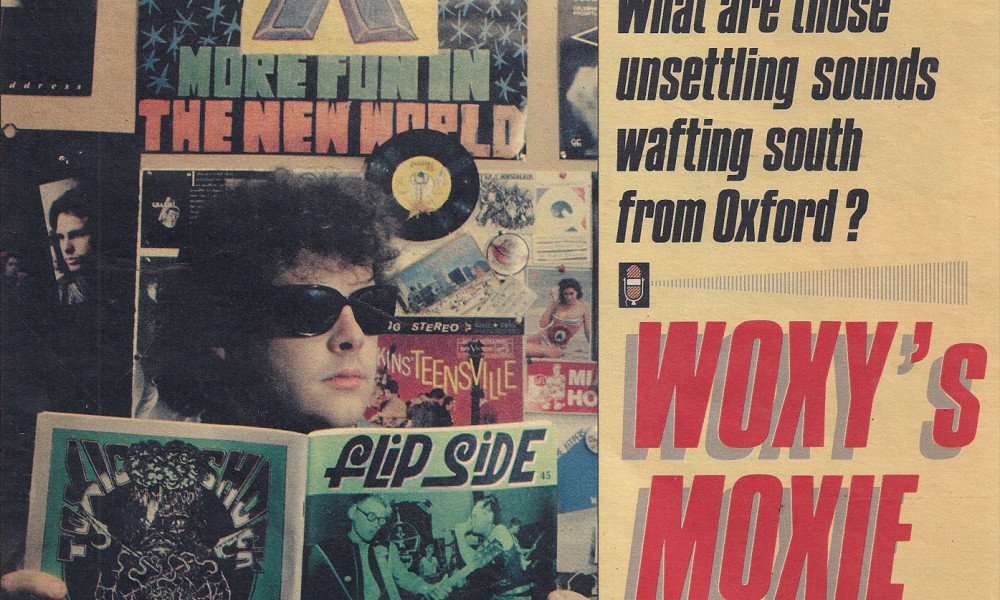
WOXY’s Moxie: 97X Remembered
Throughout life, but perhaps most profoundly in our youth, we encounter things or people that click on a cellular level—a movie; a book; a group of friends that awakens, challenges or reflects our feelings or worldview in ways that help define our identity.
For me, it was a radio station: WOXY 97X, based out of Oxford, OH near Miami University. In late 1983, at exactly the same time that my consciousness about music exploded beyond the confines of Top 40 radio, 97X began broadcasting a modern rock format that just barely reached the 35 miles to my home north of Cincinnati.
I lacked two advantages my friends had in exposure to alternative music—older siblings and cable TV. As such, 97X filled a significant void. At a time when my tastes were at odds with the mainstream and I felt kinship with little else, 97X became my tribe, making me feel less like a misfit.
Unlike corporate-owned commercial stations where music is chewing gum and DJs’ on-air personalities range from vapid to outrageous, family-owned WOXY drew in people devoted to the best in new music. That dedication persisted even after the family sold the license to 97.7 FM in 2004 and the station continued broadcasting online-only, nearly unprecedented at the time. Sadly, it was a business model plagued with prohibitively high costs. Despite changes in owners, funding strategies and headquarters—not to mention the DJs uprooting their lives and moving from Ohio to Texas in order to keep the station alive—WOXY fell silent for good in 2010.
The loss of WOXY was like a death; its legacy still looms large for former fans and staff, who feel like family due to years spent socializing on the station’s message boards. Each Memorial Day is a bit sadder for the absence of the Modern Rock 500, a multi-day countdown of the 500 most seminal modern rock tracks. (If you’ve got 34 hours to spare, a fan has recreated, as best as possible, the final MR500 on Spotify.)
Here, as a small tribute to the people and music that shaped me, is a time capsule of WOXY’s early days which I’ve carefully saved for 30 years: a cover article from the Sunday supplement of the June 2, 1985 Cincinnati Enquirer. (A downloadable PDF of the full article with pictures is available here.)
WOXY’s Moxie
Steven Rosen, Enquirer Magazine staff writer; photos by Don Denney and Gordon Morioka.
Talking Heads, Beastee [sic] Boys, Suicidal Tendencies. You’ll hear no namby-pamby corporate rock from WOXY, the tiny station that envisions itself a giant killer.
Prove it, Danny Crash. He says his tiny 3,000-watt Oxford station, WOXY-FM, is “Cincinnati’s Modern Rock Station.” He says a sizable metropolitan audience listens to this shoestring-budget commercial rock station and its daring play list.
Instead of “safe” rock performers like Chicago and Journey, WOXY plays the Del-Lords, an angry, rugged American band whose songs, like “Get Tough,” attack Reaganism.
Instead of hard-rock chestnuts by Led Zeppelin and The Who, WOXY-FM, at 97.7 MHz, plays controversial tunes such as “Meat Is Murder” by The Smiths, a pro-pacifism, pro-homosexuality and pro-vegetarian British band.
Plus The Beastee Boys, Guadalcanal Diary, Suicidal Tendencies—groups with sound as jarring in these conservative times as Big Brother & the Holding Company, Moby Grape and Country Joe & the Fish sounded a generation ago.
And Crash, the station’s 23-year-old program director (his real last name is Reed), has the audacity to suggest this format grows more successful each week.
So prove it, Crash. Show us your ratings.
Instead, he just points to the telephone and then excuses himself from his office.
“Wait a minute,” he says. “And answer that phone when it starts lighting up.”
He then tells the disc jockey in the broadcast studio to invite telephone requests from listeners. The station has three lines, two for Oxford-area calls and a third for all others. It is that third line that immediately begins to ring and ring—some 25 calls in a quick couple of minutes.
Forest Park. Montgomery. Price Hill. Walnut Hills. Amberley. Connersville, Ind. Centerville, near Dayton. The callers don’t just want to hear music, they want to thank WOXY for being exactly what it says it is—Cincinnati’s Modern Rock Station.
“It’s the only cool station. None of the others will play new stuff in Cincinnati,” says Jim Tassos, a 17-year-old Montgomery resident. “I cant stand listening to the others.”
“Stations in Cincinnati are boring,” says John Cadwallader, 27, of Forest Park. “I don’t want to hear WEBN, I’ve been hearing that stuff for the last 10 years. I want to hear something new.”
From Centerville, 16-year-old Melissa Davis chimes in: “This station plays stuff other stations won’t play and won’t even think about.”
Enough. After about 15 minutes, Crash closes the line so the DJ can start playing the requested songs. Songs by performers who otherwise get little, if any, Cincinnati airplay.
Many of them are the startlingly high-fashion, sexually-unsettling, high-tech British performers who often are considered too weird or trendy for the American heartland. The Smiths is one example. So, too, is Malcolm McLaren, a Clarabelle-lookalike Londoner who produced an album of opera arias set to swirling, synthesized dance beats.
Others are rebellious, rough-at-the-edges American performers, often politically malcontent, socially rebellious or just generally too alienated to ever sing “We are the world, we are the children” without sounding threatening.
Husker Du, a Minneapolis trio which does a thrashing guitar rendition of the Byrds’ “Eight Miles High” with the primitive energy of a Mayan sacrifice dance, is popular at WOXY. So, too, is America’s first punk band, The Ramones.
Crash is smiling at the success of his little exercise.
“Doesn’t it give you a chill to know there are that many people out there who want to listen to something different, something new? Isn’t it cool?
“I’ll tell you, if we had some more power, we could really do some damage to those (rock) stations in Cincinnati.”
Power is indeed a problem. The station shares a one-story office building with an insurance agency on the outskirts of Oxford. Its odd decor reflects both the owner Douglas Balogh’s interests—American history, Detroit baseball and ice hockey—and the young employees’ love of modern rock.
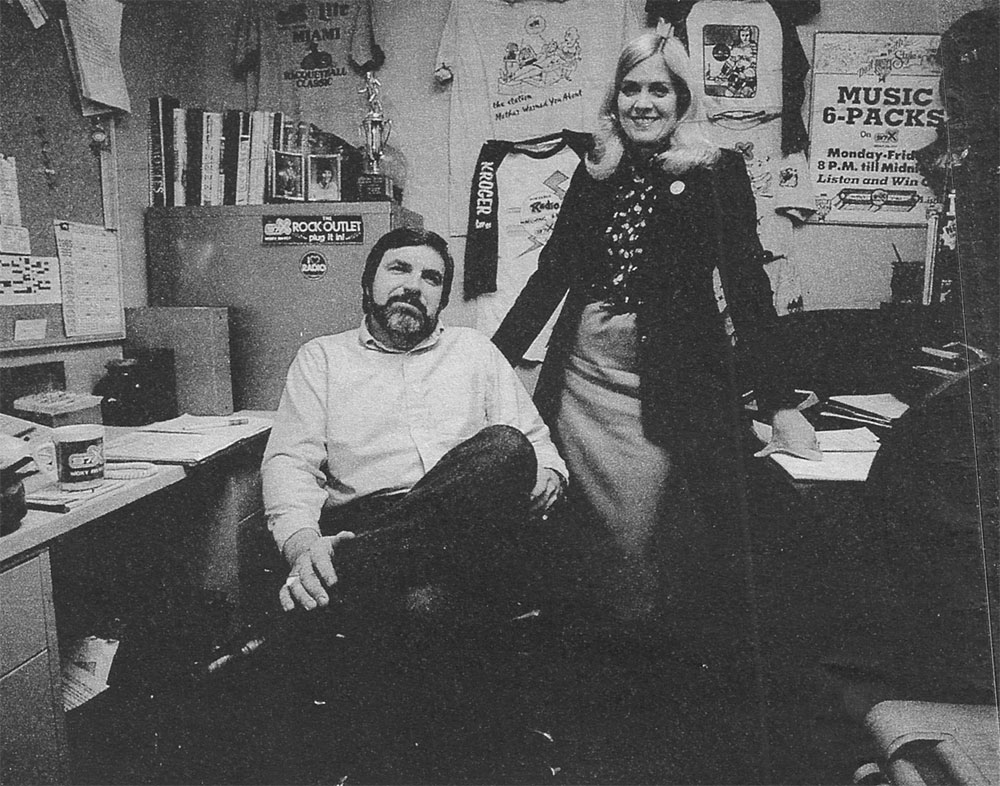
Doug and Linda Balogh
Fame and history co-exist with mere celebrity here. On one wall is a framed copy of a Detroit Times’ extra edition, with “ROOSEVELT DEAD” screaming in large type. On another are the glossy photos of trendy new rock performers—The Vels, Lloyd Cole and the Commotions and the Eurogliders.
In his small, souvenir-cluttered office, station owner Balogh displays an original 1930s bubble gum card of Eddie Shore, one of professional hockey’s greatest players.
Program director Crash, on the other hand, tends to what he jocularly calls the Carl Douglas Shrine in the broadcast room. There, leaning against the wall behind two white candles, is a copy of Douglas’ “Kung Fu Fighting and Other Love Songs” LP. A faddish disco-dance hit in 1974, it is now utterly and totally forgotten—except at WOXY.
“Quiet, please,” Crash says, feigning reverence for Mr. Douglas. “He’s one of the greats of rock ‘n’ roll—one of the biggies.”
Balogh, 42, bought the station with his wife, Linda, in 1981. They used savings from their careers in Chicago, he in a firm which purchased television time for advertisers, she as an ad agency account executive.
“As I approached my 40s, I was looking for entrepreneurship, a nice place to live and a business operation,” Balogh explains. “This place was available, and it looked like it had potential.”
The Baloghs bought Oxford’s only commercial radio station, dating back to 1959, for $375,000. They have spent much more than that since, modernizing equipment.
Balogh sees his little station as a potential giant-killer, a nobody out of nowhere trying to cop listeners and advertisers from Cincinnati. Toward that goal, he and Linda work at least 40 hours a week. And Balogh never ceases to call WOXY a “radio station located in a small market,” as opposed to a “small-market radio station.”
During his years in Chicago, Balogh attended but one rock concert—by the Beach Boys. Now, he praises the kind of performers other 42-year-old men would run from: Talking Heads, whose lead singer’s stage style resembles a lobotomized Wally Cox; and Frankie Goes To Hollywood, whose “Relax” sets sex-manual prose to appropriately pulsating music.
“The bottom-line conclusion is that in the 1980s, a lot of good music doesn’t have an opportunity to find its way onto the radio and be given a chance,” he says. “We have a chance to identify a lot of music that eventually will find its way on other stations.”
Balogh also hopes his station has a chance to make money. In 1984, operating income exceeded costs, but there’s no real profit yet.
He acknowledges that advertising lags behind audience development, and that he doesn’t yet have money for a new antenna, expensive station promotions or the Arbitron ratings service.
But he has hope. “I don’t think there’s ever been a time before when this station has had a relevance and a meaning to Cincinnati. We’re developing that.”
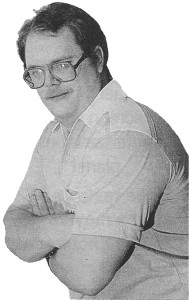
Station manager Steve Baker
What made Balogh—after one Beach Boys concert—such an expert on modern rock?
His staff taught him. He hires energetic young people, fresh out of college, to develop programming. They don’t earn much money, but they have the opportunity to run a station with meaning to them.
One such person is Steve Stenkin, a 23-year-old broadcasting major at Northern Kentucky University, who became the station’s program director in 1983 when the station switched to its modern rock format. Stenkin, who has since moved on, knew as much about rock radio formats as his boss knew about the Detroit Red Wings. He sold Balogh on the idea that a format featuring modern rock, a code word for all the types of youth-oriented music not being fully heard on radio, would mark a return to the heady days of “alternative rock” radio.
Alternative rock radio formats started here in the late 1960s, when Cincinnati’s WEBN-FM and others challenged standard Top-40 fare (Gary Lewis & the Playboys, Jay & the Americans) with unconventional, often drug-influenced hard rock.
In the days of the counterculture, performers such as Jefferson Airplane, Jimi Hendrix, Led Zeppelin and The Who mattered as much for their lifestyles as their music.
The term “alternative” no longer describes FM stations like WEBN. Now the format is “album-oriented rock,” and the new music they play isn’t as adventurous as it once was. But they are successful in the ratings, and want to stay that way. In fact, detractors coined the term “corporate rock” to describe the sound of such “album-oriented” bands as Journey, Loverboy, and REO Speedwagon.
“Since 1978, album-oriented rock stations streamlined their playlists…because people had less chance of tuning away if they heard a song they had already heard,” Stenkin says. “It’s a natural thing for people to want to hear songs they already know and like.
“In the 1980s when the style of new music went through punk and new wave to dance-oriented rock, album-oriented rock stayed away from them like the plague, because they feared a backlash.”
Surprisingly, WOXY has its supporters among program directors at Cincinnati’s larger album-oriented rock stations, WEBN and WSKS-FM. Tom Owens, WEBN’s program director, says he’s glad WOXY is trying to play relatively unfamiliar rock music, though that won’t encourage his station to do likewise.
“Compared to their embryonic beginnings, stations like WEBN are more consumer-oriented,” he says. His station, for instance, spends more than $50,000 annually to poll prospective listeners about their attitudes to songs on the playlist.
“There are an awful lot of stations playing Loverboy,” Owens admits. “Our edge is one of charisma. I feel a majority of available listeners must view WEBN as extremely spirited. The ratings show that.
“I think it’s good that (modern rock) style is being offered to the market as a whole but, as far as its impact on our competitive situation, it doesn’t demand much of a response.”
So, as a result, WOXY pretty much has the local commercial radio market to itself when it plays New Order’s “Murder,” a rare cut by a British band whose biggest songs are obscure enough.
Yet, that’s what 27-year-old Robin Plan is playing one evening on WOXY, as well as seven other songs by this mysterious British band which specializes in long, ominous and hypnotically mechanistic dance tunes.
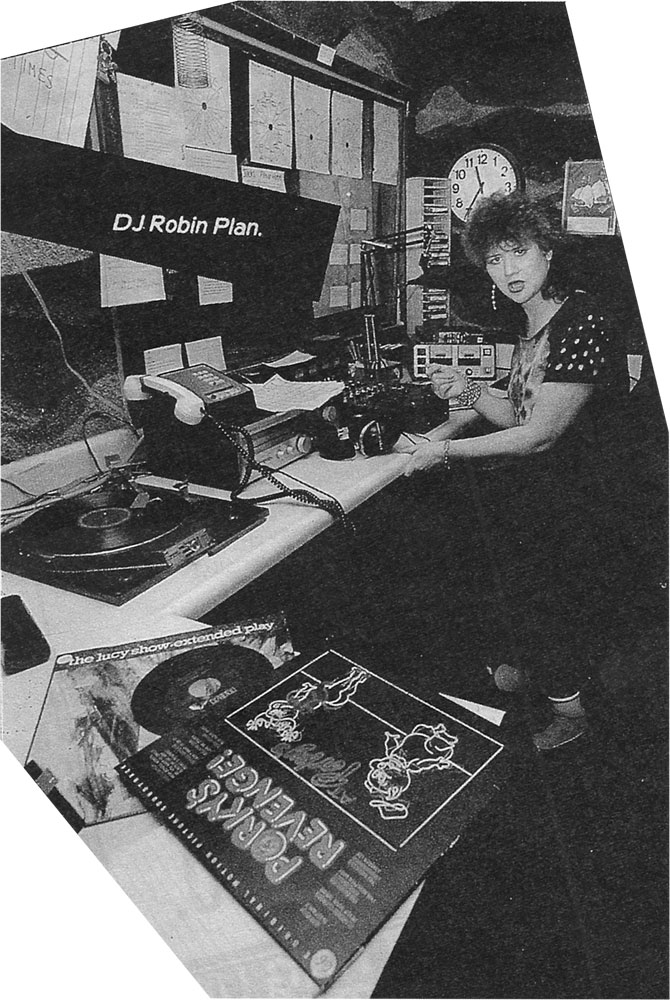
Robin Plan
Plan, who works the all-important 7-to-midnight shift, is probably WOXY’s most musically knowledgable DJ. “I always knew I was going to be either a DJ or a psychotherapist,” she says while choosing songs, answering calls and sipping from a bottle of pop.
A Minneapolis native, she dropped out of high school, went to a private broadcasting school and received a coveted radio engineer’s license in 1979. She came to Oxford in 1984, after two previous small-station jobs, to work WOXY’s graveyard shift.
Plan chats with her callers in the supportive manner of the psychotherapist she might have become. When one person requests a song by Lene Lovich, whose voice is as unusual as her name, Plan says, “Oh boy, you have good taste.” After several more calls, she announces to the audience: “There are some great requests coming in here tonight. Some good chemistry and we appreciate that. So keep rocking to 97X.”
As those New Order songs play on, Plan reflects a bit. “The best thing about working here is no mystery—it’s the music. I could probably be working at a bigger city and be in better shape financially. But I have so little respect for commercial radio. It’s important for me to play music I like.”
It’s music that a surprising number of others out there like, too. For instance, that person in Indian Hill who just called in for a little Jamaican reggae.
Sidebar: ‘Everybody Wants To Be My Mentor’
Just because WOXY-FM broadcasts at a low wattage, don’t discount its clout.
For a fledgling Cincinnati new-music trio called The Libertines, exposure on WOXY has meant surprising record sales and interest from major record labels.
When The Libertines released their first single last November, an introspective rock tune with minor-key melody and loping guitars called “Everybody Wants To Be My Sister,” no one in the band expected much to happen.
They had put it out, at their own expense, on Cincinnati’s obscure Day One label, and no one in the band even thought to provide WOXY program director Danny Crash with a promotional copy.
But Crash, shopping one day in Oxford’s Everybody’s Records, heard a salesman play the song. On impulse he bought it and began playing it on the radio.
“It was a great song and requests started coming in,” he recalls.
“It was Top 5 in requests for eight weeks. It did better than any local song ever did.”
Crash encouraged the group’s singer-songwriter, 24-year-old Walt Hodge, to send a copy to Rockpool newsletter, a music tipsheet for modern-rock and college radio stations. Rockpool editors liked the song so much they reviewed it twice.
“Since it’s a wet-behind-the-ears indie (independent label)…I fear this one might slip by,” Rockpool advised its readers in March. “It’s too much of an energetic and enjoyable pop 45 to miss.”
With that kind of word of mouth, The Libertines were able to sell 300 copies of the single and give away another 200 to interested radio stations throughout the U.S. and Canada.
Then, one day while Hodge was working as an auto parts salesman, he received a call from the Los Angeles office of Geffen Records, a major label whose roster includes Elton John and Asia. They wanted a copy of the record.
“They got back to me and said they liked the record but it wasn’t suitable for major label pick-up,” Hodge said. But now Geffen’s New York office has asked for a copy, so there still is strong interest.
Meanwhile, Atlantic Records, one of the nation’s most powerful and prestigious labels, sent Hodge a mailgram asking for a copy of the song.
As of now, The Libertines are about to record their first album, buoyed by the national interest in their first recording attempt.
“We were really flattered when we heard it played on WOXY,” Hodge says.
Notes
- If the name 97X may sound vaguely familiar, it’s probably because Dustin Hoffman’s character picked up on its tagline, “97X, Bam! The future of rock and roll” in Rainman, which was partially filmed in the region.
- The misspelling of Beastie Boys is forgivable considering that, at the time the article was written, they only had a handful of obscure singles to their name. Their debut album, Licensed To Ill, wouldn’t be released for another year and a half.
- While The Libertines’—who now distinguish themselves from the UK group of the same name by using the moniker The Libertines US—two studio albums are long out of print, a CD compiling most of those songs is available here.
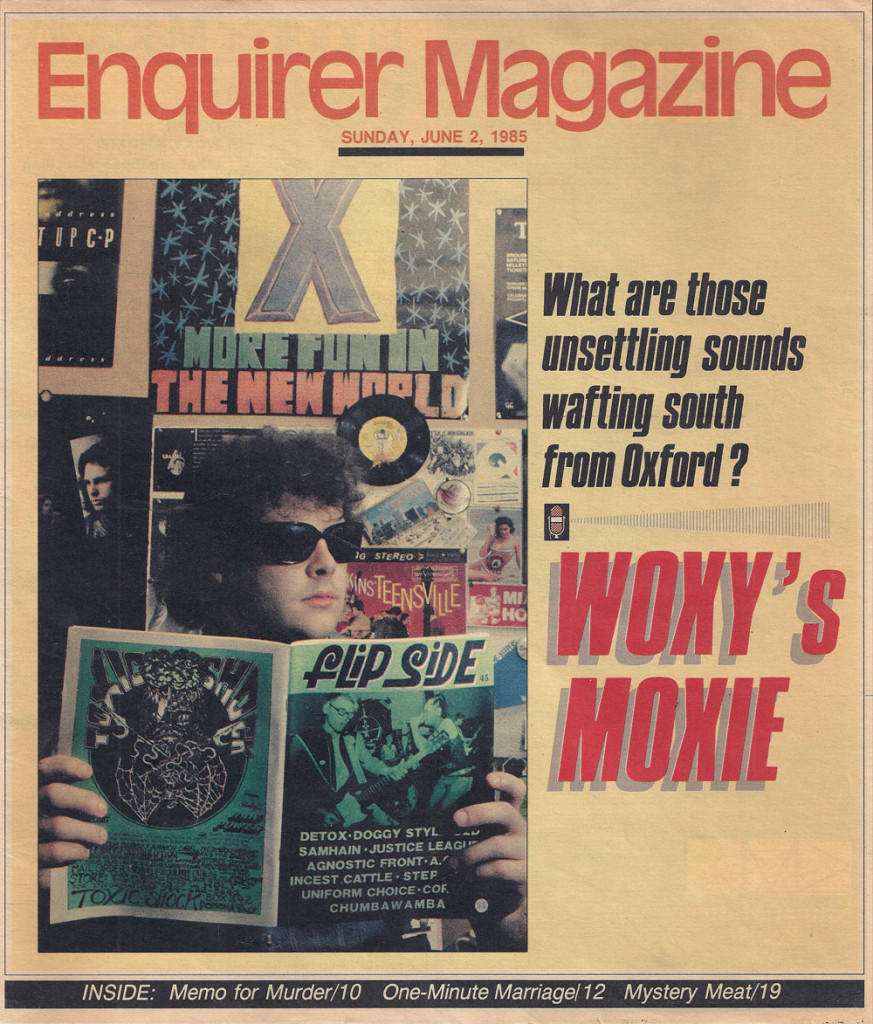

[…] year I shared a 1985 Cincinnati Enquirer article about pioneering Ohio alternative radio station WOXY 97X. Unable to get 1985 off my mind, I now […]
I started listening to 97X in 1984. I have NEVER stopped pining for it since the gang left the air in 2010.
Maybe, someday…
I am from Oxford, Ohio and a teenager of the 1980s. This radio station was such a big part of my youth and to this day I still listen to the music that played on this station. My radio never strayed from 97X and I remember that it was so cool to hear good music different from the mainstream repeats. Those were the days!
I’m from California, have lived here almost my entire life since I was born here in 1966. I have World Famous KROQ just over the hills. And yet… WOXY is a legendary name so deeply embedded in my psyche it’s difficult to separate it from the legacy of alternative and indie rock. I have an archive of playlists from much of its final decade on the air that I still mine for gold when I have the time. Unparalleled.
[…] and family-unfriendliness. For example, near the beginning of the feature Rosen says that “Instead of hard-rock chestnuts by Led Zeppelin and The Who, WOXY-FM, at 97.7 MHz, plays controversia….” Though his personal politics tend to be reactionary, Smiths lead singer Morrissey has long had […]